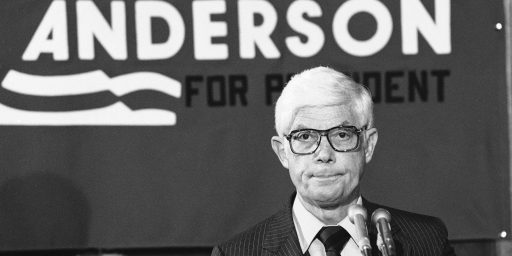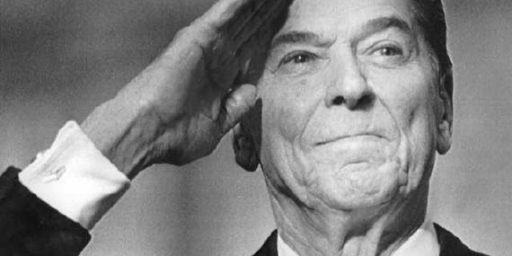Jimmy Carter Gets History Very, Very Wrong
During an appearance on Hardball this evening, while discussing with Chris Matthews the third-party/Palin scenario I wrote about this afternoon, former President Carter stated that the main reason Ronald Reagan beat him in 1980 is because of the presence of a strong third-party candidate on the ballot:
While Carter is likely right that Ted Kennedy’s primary challenged weakened him among Democrats, his assertion that John Anderson’s quixotic third-party candidacy had anything to do with Reagan’s victory simply isn’t supported by the numbers:
- Ronald Reagan 43,930,230 Popular Votes, 489 Electoral Votes
- Jimmy Carter 35,480,115 Popular Votes, 49 Electoral Votes
- John Anderson 5, 719,850 Popular Votes, 0 Electoral Votes
The popular vote difference between Reagan and Carter was 8,450,115 votes. Even if every single Anderson voter had voted for Carter instead (which is not an entirely valid assumption considering that Anderson was a Republican prior to launching his independent bid), Carter still would’ve lost the election. Moreover, those 5 million votes would not have been enough to give Carter victory in enough states to overcome an overwhelming Electoral College landslide.
So no Mr. President, you didn’t lose because of a third-party candidate. You lost because you had a fairly crappy Presidency, and you ran a pretty bad re-election campaign. Too bad you can’t admit it to yourself.






Wow, I would’ve thought a nuclear physicist could do basic math.
Poor Jimmy Carter gets the worst of it. And there was no question that he had no idea what he was doing although he did get Begin and Sadat together. He, along with Ford and Nixon did not know how to deal with inflation.
The beginning of this inflationary period started with LBJ. LBJ created inflation (printing money) to support his “guns and butter” Vietnam and the Great Society. It takes roughly three years for excess money to filter through the economy (also depending on the velocity) and then we have inflation. Nixon dealt with inflation with wage and price controls and failed and inflation, interest rates, and unemployment went higher. Ford dealt with inflation with WIN buttons and failed and inflation, interest rates, and unemployment went higher. Carter did not know what to do and kept changing fed chairmen as inflation, interest rates, and unemployment went higher. He finally (in his last year) got Paul Volcker in as head of the fed. Under Reagan, Volcker raised the prime interest rate to 21.5% and that brought down inflation. Ever since then and into the 2000’s inflation, interest rates, and unemployment came down. We had a non-inflationary economic growth for over 20 years.
Enter Bush and he has pulled another “guns and butter” Iraq, tax cuts, and Medicare part D. This time deficits and debt was used. While Bush used a different avenue, we are seeing similar results. Deficits and debt, money went to Iraq, tax cuts and spent money which does us little good today, the neglect of our infrastructure, and globalization in which we have seen more of our private sector jobs go overseas. It will take some 10 to 20 years to correct.
In Reagan’s time, it may have been proper to get government out of the way. Today, it may be, that government needs to be a leader in providing investments in our country, in our people, and in the future. We do not have the private sector that we had before. We can no longer rely on ideology as a course or direction for the economy. Government has to be the leader out of this mess with the right choices. Both democrats and republicans are not providing the right choices. We have to deal with globalization.
The electorate looks to each president or each cycle and expect results short term. There are no short term solutions. Only long term solutions. And yet, the politicians still keep missing the point.
If you look at a long term graph of twenty years or more, you can see what direction the country goes. You cannot follow a direction for four years.
Lately, our presidents are right on policy 10% of the time and wrong 90% of the time. We need to change those numbers to being right on policy 90% of the time and wrong 10% of the time. Ideology, ignorance, and arrogance makes everything impossible. While China and other countries will make mistakes, we need to see what they are doing right. Today, state sponsored spending and investments like what China is doing is taking the lead. We need to wake up or we will lose the empire we had.
I think you’re likely right but doesn’t it depend on where the Anderson votes came from? Offhand I don’t know how close some of the states with large numbers of electoral votes were. In theory I suppose that if enough very large states were very, very close it’s barely possible. I doubt it.
BTW, I voted for Anderson.
Dave,
You have a point, and if I had the time or inclination I’d go through the state numbers and try to figure that out. It’s probable that not having Anderson on the ballot woudl’ve given a particular state to Carter, but it seems highly unlikely that it would’ve been enough to win, especially with states like Texas and California firmly in Reagan’s camp.
Anderson was a factor in the race, but hardly the determinative one. Most historians point to the debate the week prior to the election, which Anderson wasn’t even invited to, as the event that sealed the deal for Reagan